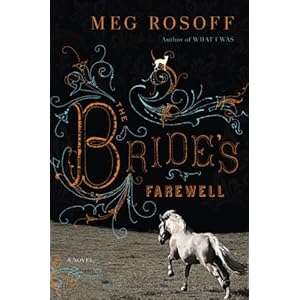The Bride’s Farewell

“On the morning of August the twelfth, eighteen hundred and fifty something, on the day she was to be married, Pell Ridley crept up from her bed in the dark, kissed her sisters goodbye, fetched Jack in from the wind and rain on the heath, and told him they were leaving. Not that he was likely to offer any objections, being a horse.”
Pell knows far more about horses than she does about men, or women, or the workings of the human heart. She understands horses, can look at a horse and see into its spirit, and know whether it will be a good worker, a good companion, a safe ride. She takes this knowledge with her to the Salisbury Horse Market, hoping to find work and somehow figure out what to do with her life, now that she’s left the only life she’s ever known behind.
Along with her parents and sisters, she leaves behind Birdie, her fiancé and neighbor, the boy who loves her deeply, who gave her her beloved horse, Jack. She feels bad about this, as she does love him. But Birdie wants children, lots of them. A house full. For that, she thinks, any other bride would do, as long as it isn’t her.
“A house full of children? She had only to look at her mother – worn and shapeless with a leaking bladder, great knotted blue veins, and breasts flat as old wineskins – to reject that plan. And worse, even, than the physical toll was the grinding disappointment, the drudgery, the changelessness of life in this place.”
Besides Jack, Pell reluctantly brings her youngest (and only surviving) brother, a mute boy brought home by her father and raised by her mother, under the agreement that this would be her last child. She has, after all, given birth to nine children. Along her journey, Pell passes through small villages, and the young women in the yards of the cottages stop and stare at her. Some with disdain, wondering what a young woman might be doing out and about in the world, unaccompanied, unprotected by a father, brother, or husband. Some with hunger, wishing that they, too, could be free of the future stretching before them, full of chores and illness and hunger, full of endless pregnancy and childbirth, living the same lives that their mothers and grandmothers and great grandmothers lived before them. Quite a few women look at her with a mixture of both of these emotions.
Off to the Horse Market they go, where Pell does indeed find work, but also loses her wonderful horse, Jack, and her little brother, Bean. Her plans suddenly change, as she has been cheated out of the money owed to her, she has no horse, and she must find her brother. The story weaves back and forth, from her dismal past with a no-good preacher of a father and a worn out mother, to her journey away from destiny. Whether destiny or free will is in control of her life, she is not sure. She only knows she must try to avoid the future that waits for her in her home village of Nomansland.
“For those poor souls who can only think of the terrible fear and danger of a runaway horse, think of this: a speed like water flowing over stone, a skimming sensation that hovers and dips while the world spins round and the wind drags your skin taut across your bones. You can close your eyes and lose yourself in the rhythm, because nothing you do or shout or wish for will happen until the running makes up its mind to stop. So you hold steady, balancing yourself in the wake, and unhook your mind from the everyday while you wait at the silent center of it all and hope that the feeling won’t stop till you’re good and ready for life to be ordinary once more.
The problem being that she never was.”
I really liked this book, really liked Pell. I found her brave and strong, yet devoted to her family and her own vision of happiness. Not all in this household agreed, however. Maya read the book before I did, and kept asking me whether I hated Pell yet. Whether I had come to my senses and saw what a cruel, evil, selfish person she was. She asked if we could burn the book when I was finished with it. She wanted to cross out the word “Pell” throughout the book, and write in something akin to ‘crazy bi-otch’. So, The Bride’s Farewell, by Meg Rosoff, gets mixed reviews around here. Read it, and decide for yourself.
One Comment
Karen MEG
You really should ask Maya how she REALLY feels about the book ;)!
It sounds like a really interesting read…once I make room on my “to read shelf”. Someday,,,